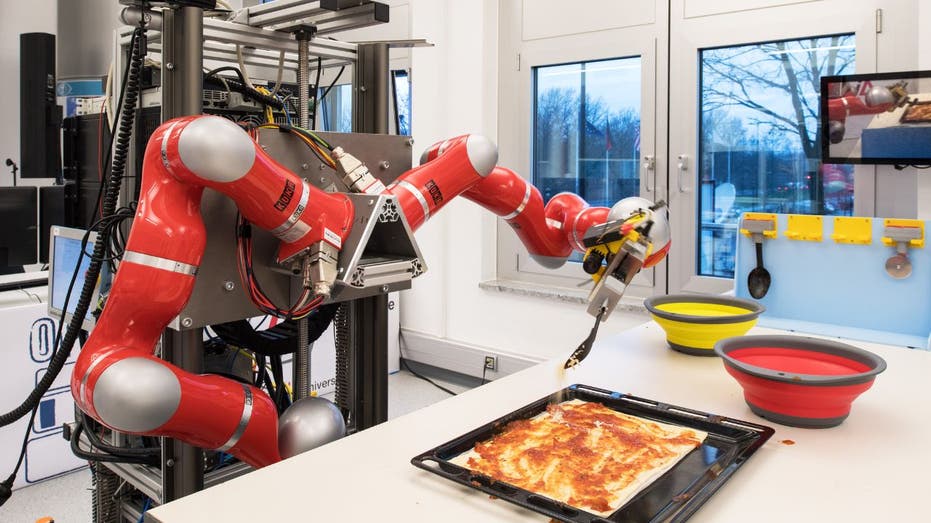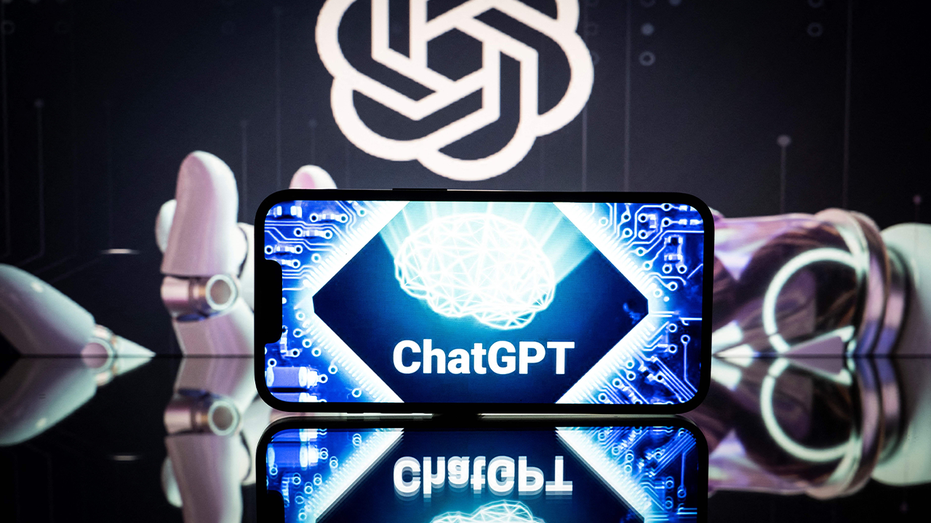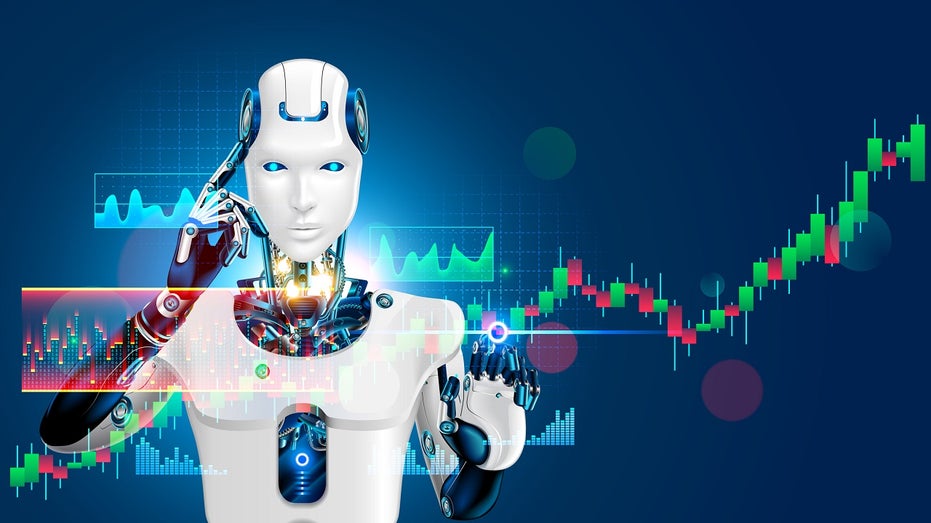The rapid expansion of the availability of artificial intelligence will likely result in massive career shifts in the not-too-distant future.
"AI will lead to a change in the workplace we haven't seen since automation affected blue-collar workers in the 1970s and 80s," Christopher Alexander, the chief analytics officer of Pioneer Development Group, told Fox News Digital. "The difference is that rather than robotics replacing factory workers, AI will replace lower-skilled white-collar office workers."
Alexander's comments come as a recent survey by market-research firm Censuswide found that mid-level office professionals are already bracing for the impact of AI on their careers, with 50% indicating that they already use the technology in some form. However, many of the same professionals say they do not have a firm understanding of AI, with 53% indicating they would like more guidance or training on the new tech.

A robot at the Institute for Artificial Intelligence makes pizza in Bremen, Germany. (Ingo Wagner/picture alliance via Getty Images / Getty Images)
While AI might just be used to supplement the productivity of existing workers at first, Alexander believes that the technology will lead to significant job losses.
"While industry apologists like to claim a significant number of jobs will be created from AI, that is largely wishful thinking," Alexander said. "If the types of AI envisioned for the near future won't replace workers, it would make no sense for a company to implement it. For the short term, it is possible many companies will simply reduce hiring as AI augmentation enhances worker productivity."
As technology continues its rapid development, and businesses begin to realize the ways it can be harnessed, some believe there could be a rush towards adopting AI for many tasks.
"With the advent of AI, there’s going to be a rush to transform our economy by automating as much as possible as quickly as possible, "Jon Schweppe, the policy director of the American Principles Project, told Fox News Digital. "Some folks will sell this as ‘good’ for the economy — and maybe it will be for tech stocks — but the reality is it will wreak havoc on the labor market and leave potentially millions of people out of work."
Samuel Mangold-Lenett, a staff editor at The Federalist, expressed a similar sentiment, arguing that some tasks that used to be carried out by humans will soon be under the domain of AI.
"Why would someone need to hire an entry-level programmer when they can use an AI to perform the same task at a fraction of the cost? This is just one example, and as AI becomes more common the same question will need to be asked in every industry," Mangold-Lenett told Fox News Digital. "Why hire a human when using an AI can perform the same task? The best solution is finding ways to integrate industry with AI so that humanity is made more productive but also isn't rendered obsolete."

This picture taken on Jan. 23, 2023 in Toulouse, southwestern France, shows screens displaying the logos of OpenAI and ChatGPT. (LIONEL BONAVENTURE/AFP via Getty Images / Getty Images)
However, Phil Siegel, the founder of the Center for Advanced Preparedness and Threat Response Simulation, told Fox News Digital that there will also be opportunities that will arise as AI gets adopted, something professionals will have to be ready to take advantage of.
"Mastering the new AI tools being launched will allow workers to be more productive, get promoted, and be ready for the next set of tools that come after," Siegel said. "This has been true of past booms like the PC revolution, Internet, and social media. There are opportunities in design, programming, implementation, and in traditional roles that will use the new technologies such as sales, R and D, and distribution."
Siegel cautioned that adopting AI in the workplace could also be more difficult than during other economic transformations, arguing that the use of AI will require "more skills in logic and math."
"That is because the underlying technology of the products is more complex and mathematical in nature. Lots of opportunities like past booms but also lots of risk for those who don’t adapt and train themselves in the new skills," Siegel said.

Robot trading on the stock market photo illustration. (iStock / iStock)
Meanwhile, Alexander believes there will be an entirely new class of professionals that will be tasked with ensuring an organization's AI strategy works seamlessly.
"There is going to be a whole new class of experts- the prompt engineers. Prompts are the key to harnessing AI for a specific purpose, and this includes knowing how to speak effectively to the AI for optimal results," Alexander said. "Additionally, the ability to develop prompts and rules for purpose-built applications that rest on larger AI systems will be another major area employers will need to consider.
"The way we work will be different, the number of people working on a given problem will be different, and the 'IT guy' who was so crucial to set up computers for productivity will have an even more vital cousin in the form of the prompt engineer who will ensure AI works as effectively as possible for a given department or team."
White-collar jobs are likely to be more affected by generative AI than blue-collar jobs, according to a report released today by Pearson plc, a provider of online training, textbooks, and skills assessments.
Approximately 30% of white-collar roles could be done by generative AI, Pearson found. However, less than 1% of blue-collar jobs could be done by generative AI.
Many of the most affected white-collar roles contain repetitive tasks such as scheduling appointments or answering and directing calls. On the other hand, white-collar roles that are likely to be least impacted include those involving tasks related to mathematics, such as engineers.
Many blue-collar roles — such as landscapers, mechanics, or construction workers — include manual labor or customer service elements that can’t easily be replicated by generative AI.
Pearson’s report analyzed the impact of generative AI on more than 5,000 jobs in five countries: Australia, Brazil, India, the US, and the UK.
Pearson listed both the most and least impacted jobs in the US by the percentage of hours spent on tasks that can be automated or augmented by generative AI.
White-collar jobs
Most impacted:
- Medical secretaries, 40%
- Statement clerks, 38%
- Billing, cost, and rate clerks, 38%
- Loan interviewers and clerks, 38%
- Bookkeeping, accounting, and auditing clerks, 38%
Least impacted:
- Chief executives, 10%
- Civil engineers, 10%
- Electrical engineers, 11%
- Sales managers, 13%
- Architectural and engineering managers, 13%
Blue-collar jobs
Most impacted:
- Farm products buyers, 27%
- Amusement and recreation attendants, 26%
- Restaurant, lounge, and coffee shop hosts, 24%
- Food service managers, 22%
- Computer-controlled machine tool operators, metal and plastic, 21%
Least impacted:
- Bus and truck mechanics and diesel engine specialists, 0%
- Dishwashers, 0%
- Highway maintenance workers, 0%
- Laundry and dry-cleaning workers, 0%
- Solderers and brazers, 0%
A majority of freelancers are using artificial intelligence, according to research by talent platform Freelancer.com.
Its global survey of 8,100 freelancers found that 73% are using generative AI tools in their work.
Still, the percentage of tasks that freelancers are automating via AI varies. Approximately 35% globally use AI to automate a quarter or less of their tasks and projects. And 16% say they use AI to automate between a quarter to half of their tasks.
Only 9% of freelancers say they use AI to automate nearly all of their work.
However, nearly half of freelancers, 48%, are very concerned about AI taking over their jobs. In addition, 31% are somewhat concerned. Only 21% are not concerned.
Globally, 28% of freelancers are optimistic about new opportunities that AI may present, and 20% believe AI will make them more productive.
Looking just at freelancers in the US, Freelancer.com found:
- 75% are using AI in their work.
- 33% are using AI tools all the time.
- ChatGPT is the most popular AI tool, with 57% saying they are using it. ChatGPT was followed by Bard and Bing Chat, 21%; GitHub Copilot, 12%; and Midjourney, Stable Diffusion and Dall-E, 10%.
- 58% are very concerned about AI taking their job, more than in any other region surveyed; 20% of US respondents are not concerned about it.

